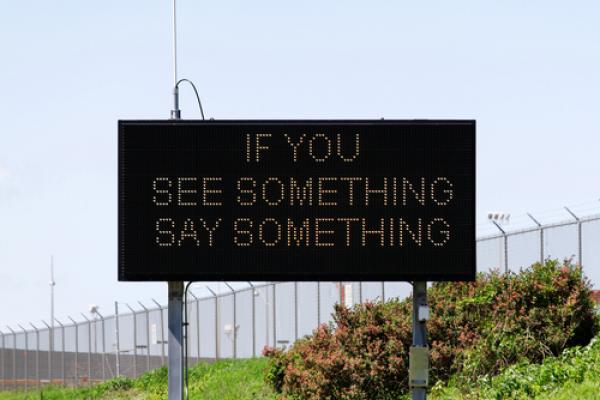After the tragic events of 9/11, President George W. Bush proposed the establishment of an Office of Homeland Security to “detect, prepare for, prevent, protect against, respond to, and recover from” a wide variety of potential and/or present threats within the confines of the United States.
Since the formation of the U.S. Office of Homeland Security we have witnessed a significant rise in security-related efforts in all corners of the country. For example, U.S. citizens are well associated with color-coded risk advisory scales, readiness websites, cyber-security frameworks, heightened immigration and border patrol blueprints, and numerous other strategies that are meant to protect “us” from the so-called “them.” The department was authorized a budget of $46.9 billion for 2012, with expenditures ranging from nuclear detection and personnel training to advanced science and technological development (and one can assume that such budgetary priorities will remain). In the midst of it all, the new normal in the U.S. appears to be one of heightened security, for in addition to noticeable increases in federal government expenditures, the private security industry is also growing (and thus flourishing) at a rapid pace, as the number of full-time security guards – not to mention corporate profits – are at all-time highs.
We clearly live in a world that is filled with risks and dangers, and because the increased availability of modern technology allows for harm to occur at unprecedented rates and levels, one can argue that we live in one of the most treacherous eras of human history. However, while the need for protection from harm is both natural and commendable, we are forced to consider whether protection itself can eventually become harmful, unnatural, and even condemnable. In other words, with such extensive resources invested in the pursuit of safety and security, one is forced to consider: What are the consequences of such “protection?" And what happens when so much time and effort is dedicated toward protecting ourselves from our neighbors that we eventually lose sight of who are neighbors actually are? At what point does the heightened priority of protection lead to the increased inevitability of isolation and ignorance? And finally, in our efforts to build impenetrable walls of protection (often in the name of freedom), do we not eventually incarcerate ourselves from the rest of the world and thus limit what it actually means to live free?
While Jesus of Nazareth clearly lived in a social context far different from our own post-Sept.11 reality, he was fully aware of the risks and dangers that surrounded him, yet he was also cognizant of the vast consequences that an overindulgence in security can have upon a community. Throughout his Sermon on the Mount and other public teachings, Jesus tore down the notion that people needed to fear each other, and in doing so revealed that authentic relationships come not through walls of anxiety, but within the open pathways of vulnerability. In fact, Jesus named as “blessed” the very things that produced an increased susceptibility to harm, and after embodying such commitments by dying on a cross, he affirmed that it is better to embrace others with vulnerability and faith than to exclude with hostility and fear.
As the season of Lent allows for discernment and self-examination in the context of our ever-changing world, perhaps the time is upon us to fast from the fear of our neighbors – both locally and globally – and thus commit ourselves to the practice of homeland insecurity. Instead of placing our ultimate faith in government programs and private contractors and devices, and rather than looking at the so-called “them” with suspicion because of what might happen to “us,” perhaps we can find real security in God’s abundant grace and thus find more faithful ways to live in our increasingly connected global community. While times have indeed changed, and risks most certainly abound, we make a peaceful future by boldly living intro it, and in doing so affirm that the only real weapon of mass destruction in our world is not to be found in some distant country, but it is the fear of our neighbors that too often sits in our misguided hearts. And so, even in a post-Sept. 11 world, the wisdom of our spiritual fore-parents continues to remain true: The best security policy is not to hide from our neighbors behind fences and walls, but to love God and love our neighbors, and in doing so embrace our neighbors to the point in which the so-called “them” eventually becomes a grace-filled and all-encompassing “us.”
While such open pathways of neighborly vulnerability produces homeland insecurity, they help us to receive God’s radical hospitality, and in turn we receive a larger taste of what it truly means to be free.
Brian E. Konkol is an ordained pastor of the Evangelical Lutheran Church in America and serves as chaplain of the College at Gustavus Adolphus College in St. Peter, Minn.
Image: 'If you see something, say something" outside an airport, Katherine Welles/ Shutterstock.com
Got something to say about what you're reading? We value your feedback!
